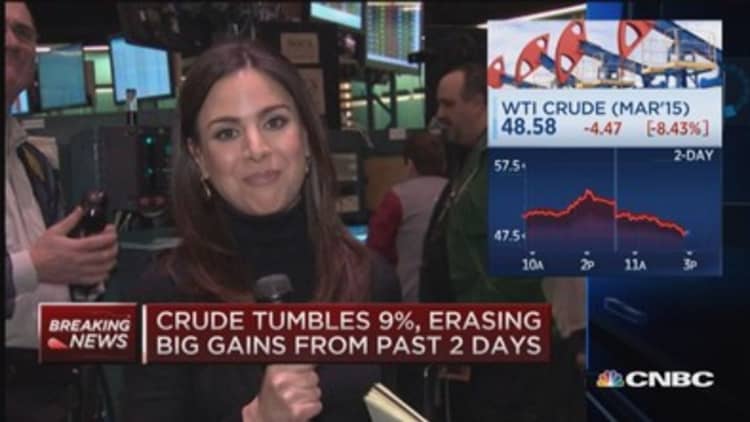Falling oil prices have been a godsend to everyone who drives, but airline passengers have yet to see ticket prices fall as a result.
The nation's airlines were quick to boost fares when jet fuel prices went up—fuel is their biggest expense. But now that fuel prices have taken a nosedive and profits are soaring, consumer advocates are blasting the airlines for not lowering fares.
In a recent letter to the CEOs of the major U.S. airlines, Travelers United and FlyersRights.org claim the airlines are keeping ticket prices high to "gouge" the public.
Read more from NBC News:
Taiwan Plane Crash: TransAsia Checks Safety on All ATR 72 Planes
Russians Feel Pinch as U.S. Sanctions Bite, Oil Prices Plummet
Study Measures 'Missing Oil' From 2010 BP Spill on Gulf Floor
"The airlines are saving billions of dollars and it's time that consumers get a little bit of that back in some sort of relief," said Charles Leocha, chairman of Travelers United.
Airlines for America (A4A), a trade organization that represents the nation's carriers, responded to that letter with their own on Tuesday.
"Lower fuel prices are benefiting consumers every day as airlines add seats and service, invest in new products and places, and reward employees," wrote Sharon Pinkerton, A4A's senior vice president for legislative and regulatory policy.

U.S. airlines lost $63 billion dollars from 2001-2010, Pinkerton explained in her letter, so they remain "focused on reducing the tens of billions of dollars they still carry in debt," rather than responding to a potentially short-term drop in fuel prices.
Last week, when American Airlines announced a record annual profit of $4.2 billion in 2014, CEO Doug Parker made it clear he had no plans to cut prices.
"Brent (crude oil) was over $100 a barrel for nearly four years and it has been under $100 a barrel for merely four months," he said. "So we are going to continue to run [our airline] as though we are still operating with $100 per barrel oil."
Is there competition?
Paul Hudson, president of FlyersRights.org, calls that "arrogance." He says the airlines have no reason to do anything because competition in the industry is now virtually non-existent.
Read MoreOil heading for $30, currency war coming: Analysts
"It's analogous to OPEC or any other cartel," Hudson said. "When you have complete domination of the market, you can control the price."
Travelers United says the nation's four big airlines control 80 percent of the market and keep prices high by maintaining capacity discipline - that is, they don't add new flights when there's increased demand. Leocha called on the Department of Transportation and the Department of Justice to look into this practice.
"The free market system isn't working anymore," he said.
Read MoreHow cooking oil could power your plane
The nation's airlines see it quite differently. In her letter, A4A's Sharon Pinkerton called air travel "an excellent value" with average round-trip domestic fares, including revenue from various fees, falling 10 percent since 2000. Pinkerton said the airlines are adding seats. The number of domestic seats available is at its highest point in seven years, she wrote.
"Consumers are benefiting in many ways from the kind of competitive, market-based models that Congress envisioned when it deregulated domestic air service," she wrote. "The bottom line is this: customers ultimately determine pricing and vote with their wallets every day about what they value and are willing to pay for."
FlyersRights.org tells NBC News it plans to launch a petition campaign in the next few days, calling on the White House and Congress to review and consider withdrawing the antitrust exemptions granted to the nation's airlines.

